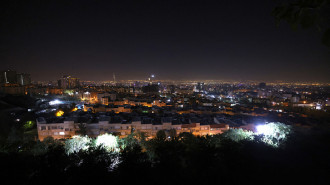Taliban in control of Afghanistan, panic in Kabul
Victorious Taliban fighters patrolled Kabul on Monday after a stunningly swift end to Afghanistan's 20-year war, as thousands of people mobbed the city's airport trying to flee the group's feared hardline brand of Islamist rule.
President Ashraf Ghani fled the country on Sunday night as the insurgents encircled the capital, capping a military victory that saw them capture all cities in just 10 days.
"The Taliban have won with the judgement of their swords and guns, and are now responsible for the honour, property and self-preservation of their countrymen," Ghani said after fleeing.
Government forces collapsed without the support of the US military, which invaded in 2001 after the September 11 attacks and toppled the Taliban for its support of Al-Qaeda.
But the United States ultimately failed to build a democratic government capable of withstanding the Taliban, despite spending billions of dollars and providing two decades of military support.
After police and other government forces gave up their posts in Kabul on Sunday, Taliban fighters took over checkpoints across the city and entered the presidential palace.
Militants with rifles slung over their shoulders were also seen walking Monday through the streets of the Green Zone, the formerly heavily fortified district that houses most embassies and international organisations.
The Taliban sought to reassure the international community that Afghans should not fear their them, and they will not take revenge against those who supported the US-backed alliance.
In a message posted to social media, Taliban co-founder Abdul Ghani Baradar called on his fighters to remain disciplined after taking control of the city.
"Now it's time to test and prove, now we have to show that we can serve our nation and ensure security and comfort of life," he said.
The Taliban's capture of the capital had occurred, as in many other cities, without the bloodshed that many had feared.
But there were desperate scenes at Kabul's airport on Monday as people tried to board the few flights available.
"We are afraid to live in this city," a 25-year-old ex-soldier told AFP as he stood among huge crowds on the tarmac.
"Since I served in the army, the Taliban would definitely target me."
The United States had sent 6,000 troops to the airport to ensure the safe evacuation of embassy staff, as well as Afghans who worked as interpreters or in other support roles.
Other governments had also organised charter flights.
The US government said Monday it had secured the airport, but there was still chaos with witnesses reporting American soldiers firing in the air to warn off crowds.
Authorities then cancelled all remaining commercial flights because of the chaos.
"There will be no commercial flights from Hamid Karzai Airport to prevent looting and plundering. Please do not rush to the airport," the Kabul airport authority said in a message sent to reporters.
The United States had earlier released a statement with more than 65 nations urging the Taliban to let Afghans leave the country, warning of accountability for any abuses.
UN Secretary General Antonio Guterres urged the Taliban and all parties to "exercise restraint" and said the rights of women and girls, who suffered under the previous Taliban regime, must be protected.
The Taliban imposed an ultra-strict interpretation of sharia law during their 1996-2001 rule.
This included banning girls from schools and women from working, while people were publicly stoned to death for adultery.
The US government has insisted in recent days that its two decades of war in Afghanistan was a success, defined by quashing the Al-Qaeda threat.
President Joe Biden also said he was determined there was no choice but to withdraw American troops, as he would not "pass this war" onto another president.
But the US administration was left shocked by the rapid collapse of the Afghan government, and its critics have said the United States' reputation as a global power has been badly tarnished.
"America's credibility as an ally is diminished," said Husain Haqqani, Pakistan's former ambassador to the United States.

![Palestinians mourned the victims of an Israeli strike on Deir al-Balah [Getty]](/sites/default/files/styles/image_684x385/public/2024-11/GettyImages-2182362043.jpg?h=199d8c1f&itok=xSHZFbmc)


![The law could be enforced against teachers without prior notice [Getty]](/sites/default/files/styles/image_684x385/public/2178740715.jpeg?h=a5f2f23a&itok=hnqrCS4x)
 Follow the Middle East's top stories in English at The New Arab on Google News
Follow the Middle East's top stories in English at The New Arab on Google News

![Thousands of people have fled from Lebanon to Syria as a result of Israel's war [Getty]](/sites/default/files/styles/image_330x185/public/2024-11/GettyImages-2180619380.jpg?h=199d8c1f&itok=q4PK1BtW)
